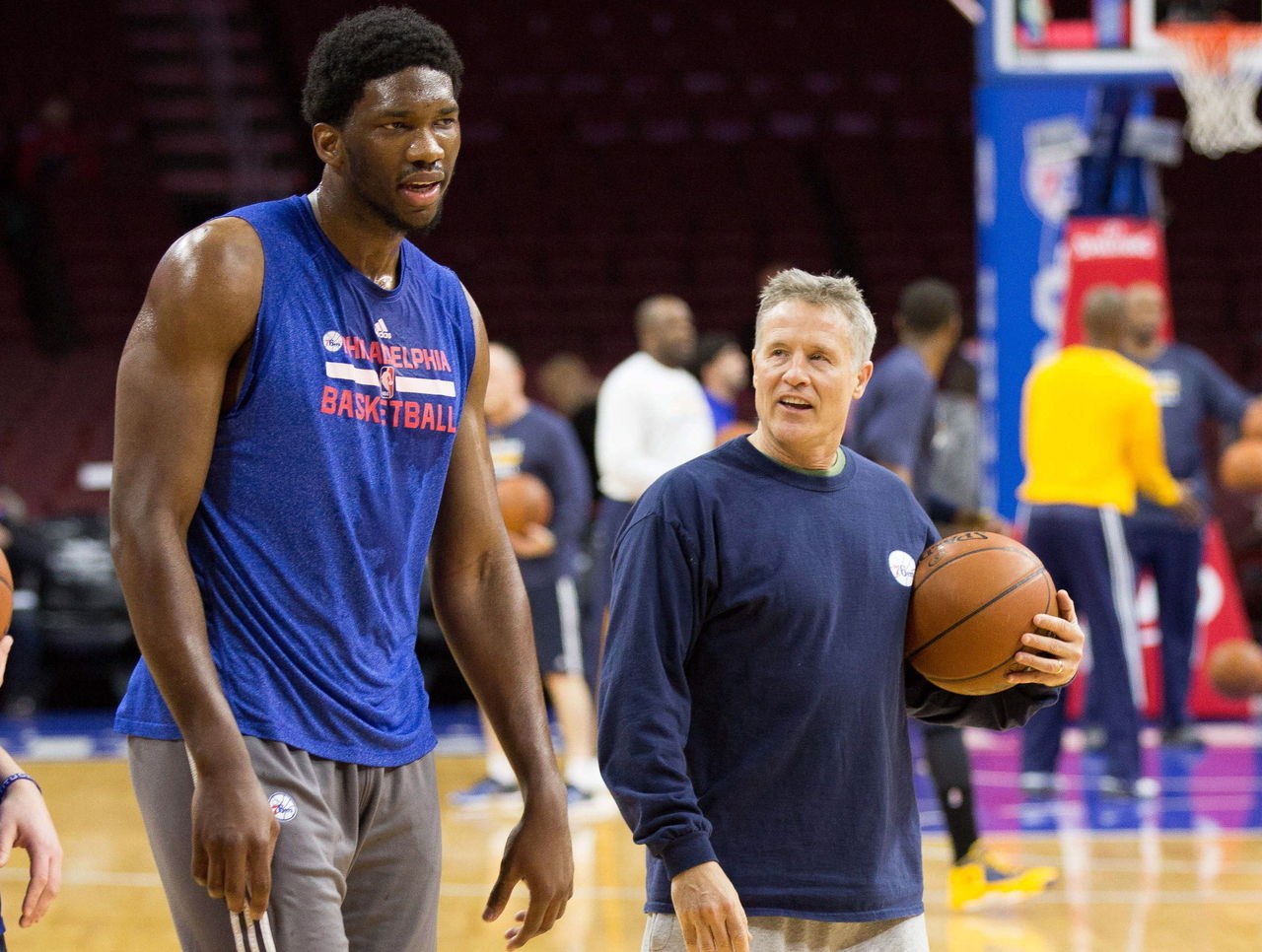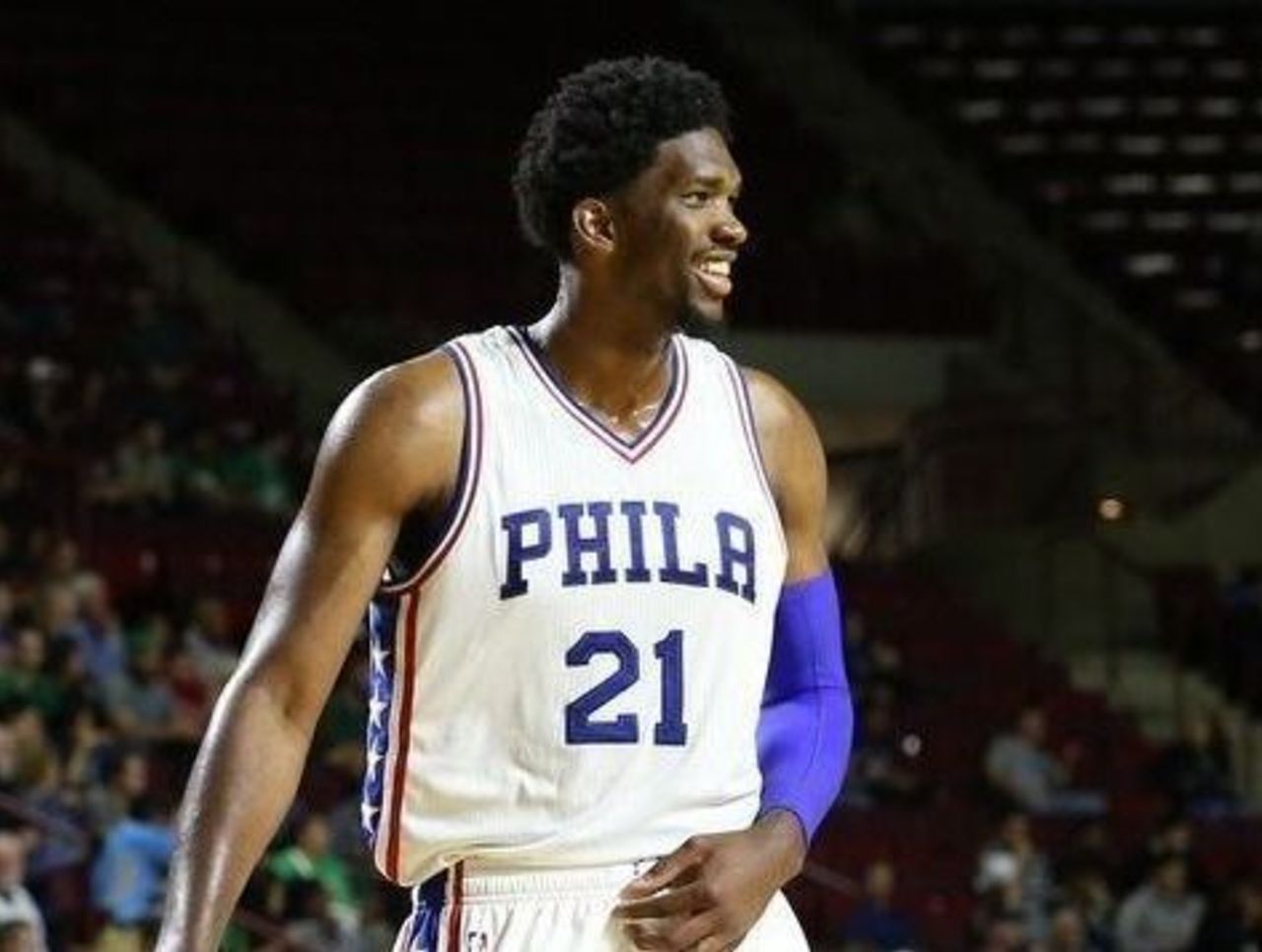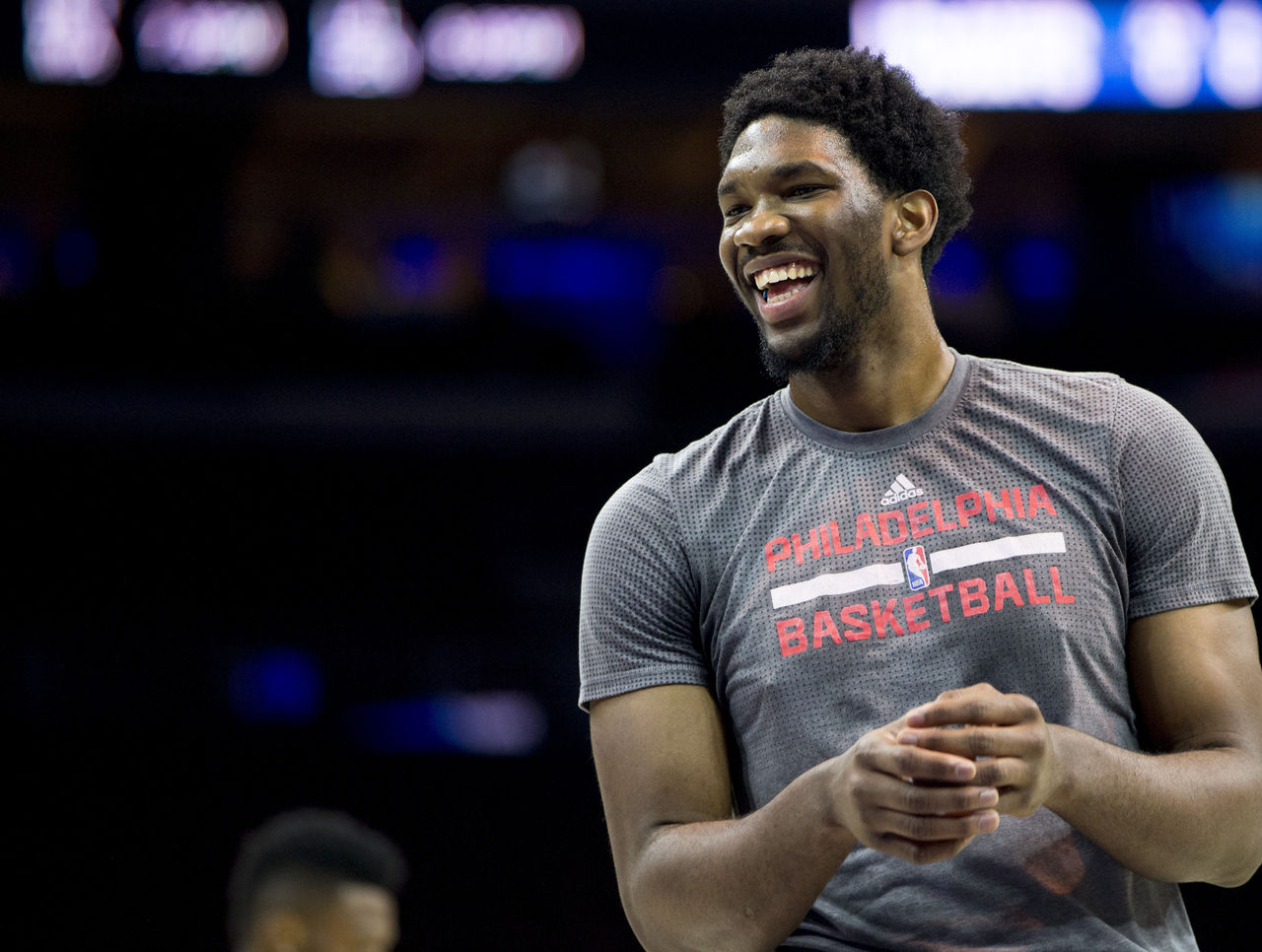Pump the brakes on your fantasy love for Joel Embiid
Follow theScore's fantasy feed on Twitter (@theScoreFantasy) for the latest news, features and more.
The early returns are in, and while the consensus average draft position gathered by FantasyPros have some recency news-related issues to iron out (I don't think Chris Bosh merits a ninth-round selection anymore), Philadelphia 76ers rookie Joel Embiid has been generating a ton of heat on the fantasy landscape with every preseason power dunk.
He has been taken as the 129th player off the board on average, though he stands to rise much higher as fantasy owners continue to mock draft with just two weeks remaining until opening night. In ESPN mocks, he's going 114th, even though the vast majority of experts have him ranked lower, including our own rankings which have him at 160th.
Through three preseason games, Embiid has recorded 7.7 points, 3.7 rebounds and 1.3 blocks in just 12.9 minutes per game. Given the fact that this is really the first time anyone has seen him perform against an opponent that wasn't a 6-foot-tall assistant coach or a folding chair since his time at Kansas, expectations in fantasy are justifiably high, even if his overall statistical production so far has been relatively pedestrian.
If he keeps racking up the Vine-worthy plays - like this slam and this rejection - his draft stock could see some enthusiastic drafters start taking him inside the top 100. That would be a tremendous mistake for a number of reasons.

Philadelphia's self-imposed limitations
The 76ers have already made it known that Embiid likely won't play in both halves of back-to-back games. This season, the team has 17 such back-to-back situations in their schedule. It's unknown whether that particular restriction could be scaled back by mid-season, but if Embiid were to sit out one game in each of those back-to-backs, it would cap him at 65 games.
Beyond the number of games Embiid could miss, there's also the matter of a self-imposed minutes limit on a per-game basis. This preseason, he started at 12 minutes a night with a goal of reaching 20-24 minutes by opening night.
Minutes restrictions aren't uncommon for players coming off of significant injuries and rookies are prone inconsistent minutes to begin with. That said, even the best-case recent young projects didn't see much more than 20-to-24 minutes a night; Giannis Antetokounmpo averaged 24.6 MPG as a rookie in 2013-14 and he wasn't plagued by the same injury history as Embiid.
There's no reason to think that Embiid will see substantial number of opportunities as a rookie given how cautious Philadelphia has been to date.

Recent Precedent
Let's concede that Embiid will average 26 MPG this season, and let's also assume he plays 65 games. Given what we know about rookies and players with long injury histories, that might be overly generous. What would a player with that workload look like? Here are the top-10 players, ranked by win-shares, who played 26 or fewer minutes and 65 or fewer games last season:
| PLAYER | G | MPG | PPG | RBG | APG |
|---|---|---|---|---|---|
| Jonas Valanciunas (TOR) | 60 | 26.0 | 12.8 | 9.1 | 0.7 |
| Tim Duncan (SA) | 61 | 25.2 | 8.6 | 7.3 | 2.7 |
| Mario Chalmers (MEM) | 61 | 22.5 | 10.3 | 2.6 | 3.8 |
| Manu Ginobili (SA) | 58 | 19.6 | 9.6 | 2.5 | 3.1 |
| Cole Aldrich (LAC) | 60 | 13.3 | 5.5 | 4.8 | 0.8 |
| Boban Marjanovic (SA) | 54 | 9.4 | 5.5 | 3.6 | 0.4 |
| C.J. Miles (IND) | 64 | 22.9 | 11.8 | 2.7 | 1.0 |
| Myles Turner (IND) | 60 | 22.8 | 10.3 | 5.5 | 0.7 |
| David Lee (DAL) | 55 | 16.4 | 7.8 | 5.5 | 1.5 |
| Al Jefferson (CHO) | 47 | 23.3 | 12.0 | 6.4 | 1.5 |
That doesn't paint the full picture of each player's fantasy value, but it is a testament to what even the very best players can do in a limited workload. Most of these players weren't rosterable in fantasy.
Valanciunas is pretty much as good as it gets - is there any chance that Embiid averages 13-and-9 as a rookie, in a crowded frontcourt that already features Nerlens Noel and Jahlil Okafor? Unlikely. The moral of the story is that if you wouldn't draft a player like Aldrich or Lee, Embiid probably doesn't offer much more.
And of course, there's a key difference between Embiid's self-imposed games restriction and the the reason why Valanciunas played just 60 games in 2014-15, which brings us to the final drawback of drafting Embiid ...

Opportunity Cost
In fantasy, you would rather a team take a hard stance on its player's health. Knowing your player will be out for two weeks usually comes with an official injured designation, which allows you to fill that spot with someone who can produce, and anything is better than nothing.
When Embiid has a scheduled day off without actually having an injury designation, he's still going to count against his owner's active roster. When Valanciunas sat out last season, his fantasy owners could still retain ownership by putting him into an INJ slot, while also adding a temporary replacement from the waiver wire.
Even if Embiid averages 10 points and 10 rebounds per game over 65 games, that production has to be stretched out over 82 games because you are effectively taking a zero in both categories when he's a healthy scratch. That drops his true production down to 7.9 points and 7.9 rebounds per game over the course of the season.
Conclusion
There has to come a point where all of the potential derailment to Embiid's fantasy value - playing time concerns, team fit, youth, inexperience, opportunity cost and above all, potential to aggravate a previous injury -- outweighs the tantalizing upside of the super-athletic big man from Parts Unknown.
On a season-long scope, drafting Embiid with anything more than a final-round draft pick is a wasted opportunity to draft a superior, fantasy-ready player. Jared Sullinger, Jusuf Nurkic and Alex Len might not be sexy picks, but they are far more likely to be superior contributors over 82 games. Frankly, their upside in 30 minutes per game is higher than Embiid's in 20.
HEADLINES
- Thunder top Nuggets in testy affair despite resting Gilgeous-Alexander in OT
- Mammoth end Wild's winning streak at 6 games
- Pistons outlast short-handed Cavaliers in OT after blaring horn delay
- Falcons dismiss assistant coach LaTroy Lewis amid sexual assault case
- Lyon makes 27 saves as Sabres top Panthers